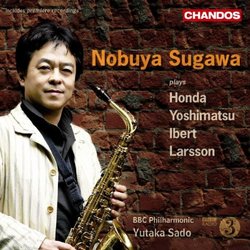| All Artists: Ibert, Larson, Honda, Yoshimatsu, Sado, BBC Philharmonic, Sugawa Title: Nobuya Sugawa plays Honda, Yoshimatsu, Ibert, Larson Members Wishing: 1 Total Copies: 0 Label: Chandos Original Release Date: 1/1/2008 Re-Release Date: 5/27/2008 Genre: Classical Styles: Forms & Genres, Concertos, Instruments, Reeds & Winds, Symphonies Number of Discs: 1 SwapaCD Credits: 1 UPC: 095115146620 |
Search - Ibert, Larson, Honda :: Nobuya Sugawa plays Honda, Yoshimatsu, Ibert, Larson
 | Ibert, Larson, Honda Nobuya Sugawa plays Honda, Yoshimatsu, Ibert, Larson Genre: Classical |
Larger Image |
CD Details |
CD ReviewsSugawa Plays Yoshimatsu...and Others Ralphus | Goyang, Gynggi-Do Korea (South) | 11/07/2008 (4 out of 5 stars) "Japanese saxophonist, Nobuya Sugawa is one of the pre-eminent figures in the classical saxophone world. In this latest release from Chandos, he brings us two premieres of Japanese works, one ubiquitous warhorse, and one under-recorded tough nut of the repertoire. The saxophone music of Takashi Yoshimatsu is made for Sugawa; literally and stylistically. Sugawa's performances of the fantastic "Fuzzy-Bird Sonata" helped to put both their names on the map. To this day I doubt whether anyone can out-play Sugawa in this work. Yoshimatsu's saxophone pieces--the "Albireo Mode" Concerto featured here included--are tailor-made for Sugawa's awesome technique: swooping, bending, growling, slap-tonguing, screeching altissimo. Sugawa pulls off his music with wonderful aplomb. The current work is for soprano and Sugawa plays it beautifully. The other Japanese work is a concerto called "Concerto du vent" by saxophonist/composer, Toshiyuki Honda. This work appeals to me much less. It is a pleasant enough 20 minutes, but it feels somewhat like a medley of jazz(y) cliches and stylized licks. Regardless of my opinion of the work, Sugawa revels in this kind of stuff and he plays it very well. Now to the slight disappointments. The presence of the Larsson Concerto was one of the main reasons I bought this disc. It's such an infamously difficult piece that recordings are rare. I have Pekka Savijoki's screechy (but still, somehow, satisfying) recording Saxophone Concerti and John Edward Kelly's impressive performance Jacques Ibert--albeit with a tone that sometimes sounds strangely like a closely-miked bassoon with sinus issues. (I'm not familiar with the Kenneth Tse performance mentioned by the other reviewer.) Unfortunately, despite Sugawa's ample technique, he under-plays the piece. Perhaps he's trying too hard to rein in the altissimo passages, to make them more integrated into the phrases (something that Savijoki can't manage) with one end result being that the whole piece sounds a wee bit subdued and flaccid. The work's astringent Neo-Classicism is lost somewhat. For this reason I still value Savijoki's and Kelly's performances. Having said that, though, his playing is refined and very well-controlled--much more so than Savijoki's. The slow movement in particular benefits from Sugawa's lyricism and silky tone. In this movement, his smoothing out of the altissimo phrases allows the music to sing without the awkward interruptions (eruptions!) of sudden onslaughts of screeching. Like Savijoki, Sugawa doesn't play the slap-tongue passages. Considering how infrequently this work is recorded, Sugawa's performance is quite welcome. The Ibert has been recorded umpteen times. (Sugawa has recorded it before too, for a Japan-only EMI release.) Again, Sugawa's take on it is very disappointing. He seems to have an aversion to tonguing. Subdued and flaccid describes this performance even more so than it does the Larsson. It's even a little slow. But, hey, Sugawa can play the saxophone, so it aint awful! I doubt, though, whether Sugawa's Ibert will supplant Mule, Bornkamp, Delangle or Louie as anyone's favorite performance. This disc by a master of the instrument has much to commend it but it is not without its let-downs. I wouldn't go so far as to describe it as an opportunity lost. Two new concertos, an 'attractive' Larsson, major label, fine orchestra, a maestro of the instrument: all very much positives. Saxophonists will want to own it, I'm sure. Those who are merely curious will still find plenty to enjoy. The BBC Philharmonic is polished and recorded sound is fine, if a little subdued (there's that word again! it just seems appropriate for this disc!). TT = 77 mins." The little master does it again... M. W. Lichnovsky | Melbourne, Australia | 08/30/2008 (5 out of 5 stars) "Nobuya Sugawa, small of stature but a giant of classical saxophone, has released yet another top quality CD. It is wonderful to have two new works added to the repertoire, and equally wonderful to have another version of the concerto by Lars-Erik Larsson. The filler in this case is yet another version of Ibert's Concertino da Camera.
Anyone who is interested in the saxophone used as originally intended will be rapt with this disc. New music, old music, exceptionally well performed. Many purchasing this CD will already have ample versions of the Ibert, but to have Sugawa's Larsson to hear next to those of Kenneth Tse and John Edward Kelly is a real treat." |
